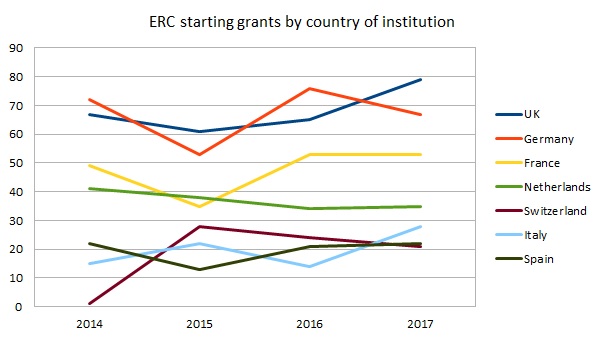The number of UK-based early career academics winning grants from the European Research Council has shot up by more than a sixth, confounding fears that the uncertainties created by the Brexit vote would put them off applying.
Seventy-nine researchers at UK institutions won starting grants in the 2017 application round, worth up to €1.5 million (£1.4 million) each, up from 67 last year, according to the latest statistics from the ERC.
This means the UK now once again leads Germany in winning such grants. These latest statistics, released on 6 September, are the first to shed light on UK participation in the ERC during an application round that took place entirely after the referendum in June 2016.
Mike Galsworthy, a founder of the campaigning group Scientists for EU, said it was "awesome" news that starting grants are "still high".
But starting grants are only one of several types of grants awarded by the ERC, which is itself just a single part of the EU's Horizon 2020 research and innovation programme, worth nearly €80 billion over seven years.

Source: ERC
Dr Galsworthy said that data on all types of Horizon 2020 grant were needed to understand fully the impact of the Brexit vote. "Then we'll have a better monitoring view on this," he said.
He pointed out that Sir Andre Geim, the Nobel prizewinning scientist who has conducted pioneering work on graphene at the University of Manchester, told Bloomberg last month that in 2017 a "steady flow" of applications from abroad to join the university's Marie Curie research programme had stopped, and he was now considering leaving the UK.
Among researchers whose EU grant bids were thrown into doubt following the Brexit vote, there now appears to be a mood of more measured optimism, but there is still uncertainty about the future.
Ali Mobasheri, a professor of musculoskeletal physiology at the University of Surrey whose continental partners bailed out of a joint grant bid after the Brexit vote, said that the latest ERC figures were "encouraging news".
"Several UK institutions have made significant investment in providing support to early career researchers preparing bids for the ERC," he said.
Ilaria Bellantuono, a professor in the University of Sheffield's department of human metabolism whose grant bids were also thrown into confusion following the referendum, said that the UK government's promise to underwrite any Horizon 2020 projects meant her team had gone "back to business as usual" and had subsequently won a grant.
"However, the uncertainty about the future is felt across the sector and there is no day that goes by without this being a topic of conversation," she added. "The prolonged uncertainty is increasingly bringing researchers to look at job opportunities elsewhere."




